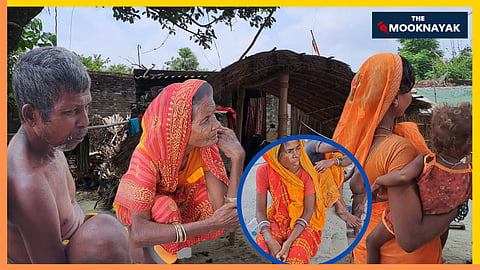
Patna/Motihari – During every Bihar election, political parties try to woo the Mahadalit community, treating them as a “vote bank.” Among them, the Musahar community remains one of the most marginalized, grappling with poverty, hunger, migration, and caste-based discrimination.
As one enters the Musahar settlement in Rulhi village of Motihari district, it feels like time has stood still. Mud huts, barefoot children, women waiting for their migrant husbands, and weary faces fighting hunger despite working in the fields all paint a picture of an India far removed from the promises made on election stages.
Around 50 Musahar families live in this settlement. Most men have migrated to Punjab, Haryana, and Delhi in search of work, leaving behind women and children. Women toil in the fields for 8–9 hours a day, yet they earn barely ₹50–60.
Speaking to The Mooknayak, Sampati Devi, a villager, said:
"Nothing is bigger than hunger. We bend our backs all day in the fields, but even then, it’s not enough to feed our children."
Her words echo the silent pain of an entire community battling hunger, poverty, and neglect.
The government’s Public Distribution System (PDS), meant to provide food security, fails the Musahar community. Villagers allege rampant corruption by ration dealers.
Poonam Devi shared her plight: "The government promises five kilos of grain, but we only get three or three-and-a-half. Where the rest goes, we don’t know."
Despite numerous welfare schemes, hunger and malnutrition remain an everyday reality here.
The struggle of the Musahar community is not limited to hunger and poverty—it extends to dignity and self-respect.
Poonam added: "When the village sarpanch visits our settlement, he covers his face, saying Musahars stink. But during elections, he comes asking for our votes."
This humiliation highlights how caste prejudice continues to haunt the community, even from elected representatives.
Despite being categorized under the Mahadalit group, Musahars remain at the bottom in education, healthcare, and employment.
Basic facilities like drinking water, nutrition schemes, and self-employment opportunities are absent in Rulhi. Lalmatia Devi, an elderly villager, said:
"Government talks about schemes, but no officer ever visits us. All we get is daily wage labor and humiliation."
The MGNREGA scheme, once considered a safety net for rural workers, has also failed the community. Instead of the promised 100 days of work, villagers get barely 20–40 days a year.
Manik, an elderly man, said with teary eyes:
"The government says we will get 200 days of work, but in reality, I only got 20–25. The rest of the time, hunger and debt are our only companions."
This stark gap between promises and reality pushes villagers into further poverty and forces them to migrate.
During elections, Musahars become the focus of political speeches as symbols of the “poor and marginalized.” But once the votes are cast, they are forgotten.
As women in the village told The Mooknayak: "Leaders only come to ask for votes. They don’t care about our children’s schools, our huts, or our empty stomachs."
Every hut, every woman’s bent back, and every child’s half-empty stomach in Rulhi village raises a haunting question:
“Is democracy only about our votes? After elections, why do hunger and humiliation remain our only share?”
You can also join our WhatsApp group to get premium and selected news of The Mooknayak on WhatsApp. Click here to join the WhatsApp group.